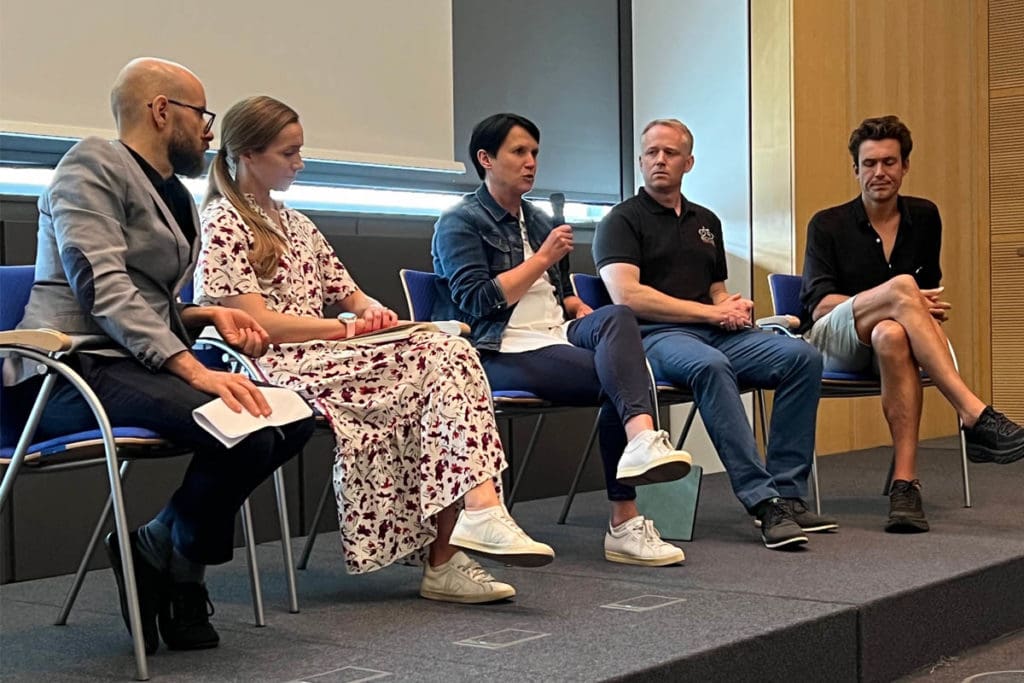Collaboration to Give Sustainability a Sporting Chance

Frankfurt, Germany
An impromptu encounter at a Eurobike 2022 workshop has sown the seeds for greater cooperation between the bike industry and the broader sporting goods industry to boost sustainability.
A workshop by the Confederation of the European Bicycle Industry (CONEBI) and Cycling Industries Europe, entitled Setting the Scene for a Sustainable Cycling Industry, outlined how the organisations are setting out to create a global sustainability strategy for the whole bicycle supply chain.
“As an industry we are coming to the sustainability game rather late. We don’t have the time and we don’t have the luxury of our individual companies and organisation doing their own CSR (corporate social responsibility) approaches,” according to Alexander Thun, the chair of a CONEBI/CIE expert group given the task of heading sustainability initiatives for the two organisations.
“We have to do this together. We will create a joint European or even global CSR strategy for our industry. We will develop very ambitious CSR milestones, targets and initiatives to go beyond national and international legislation.
“We will foster cooperation with other industries, with other sectors and other initiatives to make sure there’s no overlap and redundances because, again, we don’t have time.”
Challenged by World Sporting Goods Federation
However, the need for a separate, tailor-made sustainability strategy was challenged by one audience member at the workshop, World Federation of the Sporting Goods Industry president and CEO, Robbert de Kock.
He said the federation is a signatory to the UN charter for sustainable development goals and had a wealth of information about objectives and guidelines for the cycling, textile and footwear industries.
He called for cooperation between the federation and CONEBI so the bike industry could capitalise on the knowledge and structures already in place.
“Making sure your cycle has the lowest impact will be just as important as proving it has the lightest weight, the most efficient bearings, or the best aerodynamics.”
“I’m very pleased to hear the bicycle industry wishes to be better. The industry has not even started, so let’s make a nice start and get yourself to the sustainable development goals” Robbert told the workshop.
“It has already been very tough for everybody and if you think you can do better then fine. “The current sustainable development goals would probably be a nice target to set and they are already out there. There are lot of initiatives you can align to that make a lot of sense.”
Alexander welcomed the call for cooperation, saying it was exactly the type of collaboration his group was seeking.
More Needed to Keep Green Reputation
The workshop was told a bicycle company’s sustainability credentials would soon be just as important in its marketing strategy as the performance of its bikes.
Bicycle Association of Great Britain representative Alec Seaman said: “Making sure your cycle has the lowest impact will be just as important as proving it has the lightest weight, the most efficient bearings, or the best aerodynamics.”
He said the industry could no longer rely on the broad assumption that bicycles are a green product.
“Consumers are now used to really scrutinising everyday choices and they are now starting to look at their bikes again. There’s an understanding that just having a bike isn’t enough.”
Companies need to show their bikes have a minimal environmental impact, from the initial materials to build the bike, through its full lifecycle and disposal.
“There are lots of people in the industry who have been doing great work on sustainability but you really had to dig to find those examples.
“If you went to almost any outdoor company’s website, sustainability was usually the first thing you would see and it was easy to find if it wasn’t on the front page.
“That wasn’t the case with the cycle industry, even two years ago. You really had to search. Now it is starting to move towards the front.
“This industry has always been driven by higher, further faster. It’s been the pursuit of performance. That’s what every consumer was looking for and that’s now changing.”
